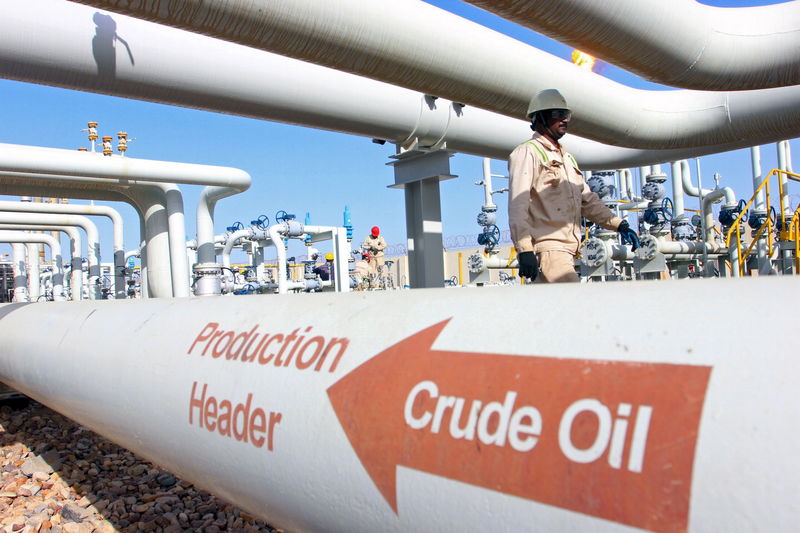(Bloomberg) -- South Korea’s biggest oil refiner is eyeing a wider U.S. crude appetite, a move that could further reduce its reliance on traditional Middle East suppliers already facing heightened supply risks as tensions flare with Idran.
SK Trading International Co. is considering heavier oil grades from the Gulf of Mexico and Canada as well as ultra-light crude from shale fields if prices are competitive, Chief Executive Officer Suh Sokwon said in an interview. The unit is the trading arm of SK Innovation Co., Korea’s top refiner.
American crude is grabbing a bigger slice of Asia as U.S. sanctions crimp supply from Venezuela and Iran, and flaring tensions in the Persian Gulf after tanker attacks and vessel seizures are adding further uncertainty for buyers in the world’s largest oil-consuming region. While some nations are seeking to beef up protection for ships navigating the Arabic Gulf and Strait of Hormuz, SK said the actual impact on energy flows has been minimal so far.
“We are on the threshold of a new era where American producers will rush to Asia to find customers,” said Suh, who was appointed as the head of SK Innovation’s trading arm seven months ago after more than 30 years of working for the company. “It would take time, but once we have enough understanding and trust in different types and quality of U.S. crude, it is even possible for us to consider committing ourselves to term contracts.”
See also: Infected U.S. Shale Oil Is Being Turned Away by Asian Buyers
A spate of tanker attacks in the Gulf of Oman ratcheted up risks of importing oil from the Middle East, home to OPEC’s top five drillers, just as sellers in America hone in on Asia as a key destination for their fast-growing exports. SK is in talks with its government for assistance on insurance and security for its shipments, and in the event of soaring risks and supply disruptions, the company will seek approval to tap into the state’s oil reserves, said Suh.
Oil Replacement
From heavier crudes to ultra-light oil known as condensates, American grades are increasingly able to displace some supplies from the Middle East. That’s providing more supply options to Asian refiners including SK, which currently buys about 4 million barrels of U.S. crude per month. South Korea’s imports from the U.S. hit a record of 13.6 million barrels last December, with latest purchases at about 11.5 million barrels in May.
In early-May, when Donald Trump’s administration opted for a hardline stance on Iran sanctions and a zero-tolerance approach to oil purchases, SK slashed its imports of South Pars condensate and in turn imported alternative feedstock such as light oil from U.S. shale fields and Kazakhstan, while soaking up more naphtha from other nations.
See also: U.S. Wish for Zero Oil Imports From Iran Granted by S. Korea
For heavier grades, Suh said higher official prices by Middle Eastern sellers were also eating into processing margins for companies such as SK, leading to operating rate cuts by refiners across Asia. Producers have been raising their offers due to a steep backwardation in benchmark Dubai oil prices, when near-term cargoes are costlier than delayed ones.
“Crack margins have bottomed out in June,” Suh said. “Gasoil and low-sulfur fuel oil profits in particular will only improve from here on as the market awaits stricter shipping fuel regulations to kick in,” he added, referring to new rules known as IMO 2020 which mandates the use of less polluting marine fuel with 0.5% sulfur from January 1, versus a 3.5% sulfur content currently.
In light of a more challenging climate and increased competition, SK may finalize of fuel sales deal with a company in Southeast Asia this month to lock in demand for its output, according to Suh, without elaborating on details of the agreement. SK is also testing out a new in-house optimization tool that takes into account real-time market dynamics, helping it choose the most profitable crude grade.
IMO 2020
The shortage of very low sulfur fuel oil, or VLSFO, in 2020 is still deeply underestimated and shipowners will struggle to find fuels that are both stable and compatible, Suh said. In light of this, SK was among the first movers with its investment in a new desulfurizer unit at its complex in Ulsan that’ll remove the impurity from heavy fuel. The addition can make 40,000 barrels a day of low-sulfur gasoil and fuel oil, on top of SK’s existing oil-blending venture off Singapore which will expand from 23,000 barrels a day currently to 90,000 barrels by mid-2020.
Apart from ramping up its VLSFO output, profits from making marine gasoil -- another fuel that can be blended into high-sulfur fuel oil to create an on-spec product -- from crude is also set to rise to at least $18 a barrel in the months ahead, versus the current margin of about $15.
“If you can’t produce qualified fuels that shipowners can trust, you will soon be out of business,” Suh said. “Our long experience in refining and offshore blending will definitely set us apart from other players.”
